#Roman Herzog
Explore tagged Tumblr posts
Text

Wozu persönliche Angriffe?
1.
Müssen doch nicht sein! Können sein. Wenn sie seien sollen, dann ist es hilfreich, scharf und griffig zu schreiben und das Schreiben scharf und griffig zu lesen. Dann kann man das Schreiben einfach persönlich nehmen und wieder loslassen, gerade weil es so scharf und griffig ist. Kleber bleibt kleben, scharfkantige Dinge nicht. Man kann die Schreiben postwendend persönlich nehmen, hilfreiche und juridische Kulturtechnik ist das.
Jedes scharfe Schreiben kann, soll eventuell sogar einen persönlich angreifen. Jedes Schreiben kann einen persönlich (a)dressieren, polarisiert ist es ohnehin und es wird weiter polarisieren. Es ist nicht unbedingt schlimm, persönlich angegriffen zu sein oder persönlich angegriffen zu werden. Der archaische Torso des Apollo im Belvedere greift einen persönlich an und macht einen persönlich angegriffen, keine Sorge, er ist nur kuratiert, nur besorgt und meint es nicht so. Nach Rilke sagt er einem: Du sollt Dein Leben ändern. Sogar die nackte Kanone kann einen persönlich angreifen, man kann Tränen lachen, aber auch beleidigt sein, wenn man das als Darstellung deutscher Staatsrechtlehre versteht.
2.
Kann man machen. Man kann persönlich angreifen, angegriffen sein und sein Leben ändern. Wenn man das tut, wenn mal also sein Leben ändert, dann ist einer der ersten Schritte, persönliche Angriffe nicht mehr persönlich zu nehmen. Jemand sagt Dir, Du seist ein Arsch. Ändere Dein Leben und siehe dann das Amtliche darin, ein Arsch zu sein und siehe dann das Wohlgesonnene frivoler Beschimpfung. Im Boudoir oder beim Doktor Flotte kann man das üben, das ist Teil nächtlich lokaler science at the bar.
Gelassenheit, wie ich das bei Martin Heidegger und bei Aby Warburg verstehe, also bei zwei Typen, die sich gut an die Gurgel hätten gehen können, heißt für beide Umgang mit Lettern, mit Mahlen und klammen Sendungen. Für beide geht Gelassenheit damit einher, zwischen Aktion und Passion etwas wenden zu können. So vollständig aktiv und so vollständig passiv ist bei der Gelassenheit niemand.
3.
Man ist darin, wenn man schließlich nach jahrelanger Übung Spezialist für Gelassenheit ist, ein Kardinal, ein Scharnier, eine Carne oder Cardea der Wendungen zwischen Aktion und Passion. Man ist dann auch Kurtisane und Partisan aller Höflichkeiten und Beleidigungen.
Die Titel, die einem versehen werden, kann man gelassen tragen, egal ob es Orden oder Narben sind, wenn man sie als Wendungen versteht. Noch den Titel Verräter kann man gelassen tragen, noch die Beschimpfung als Sozialdemokrat oder Nazischwein, als Judensau oder AfD- Wähler kann man gelassen tragen, soweit man wenden kann und in jeder Erniedrigung eine Erhöhung sieht, in jeder Erhöhung eine Erniedrigung. Wenn es physisch wird, wird es schwer.
Ich beharre darauf, Staatsrechtslehrer zu sein, beharre sogar darauf, Aby Warburg als einen Staatsrechtslehrer zu bezeichnen, ihn damit zu demütigen und zu ermutigen, zu erniedrigen und zu erhöhen. Schön ist es nicht unbedingt, nicht einmal unbedingt wahr und unbedingt richtig.
Eventuell bin ich da durch die Brandis gebrandmarkt, durch römische Geheimräte in deutschen Marken oder Ländern, nahe an den Quellen von Stahl, Kohl und Weltenkriegen. Aber ich habe das alles beharrlich gemacht und mache es weiter, um es Ernst zu machen und den Witz dabei nicht zu verlieren. Scherz und Ernst spielt nicht nur in der zivilen Iurisprudenz eine Rolle. Ich will jetzt nicht gleich mit Erklärungen kommen, warum Leute wie Jhering im Zivilrecht lieber gelesen werden als im öffentlichen Recht. Ich will schon mit den ministrablen und magistralen Empfindsamkeiten kommen, dem Wunsch, unangreifbar und nicht umstritten zu sein, im decorum zu glänzen wie Roman Herzog, hergezogen aus romanischen Ländern wie Sinti und Roma, aber darum angeblich einer, über den man man nicht herziehen dürfe, selbst wenn man weiterhin vor Sinti und Roma nicht nur Angst hat, sondern sich schämt, dass man sich vor ihnen fürchtet. Man darf mit Sinti und Roma einen trinken und essen gehen, das ist nicht nur sehr witzig, irre ist es!
Die rumänischen Berufsbettler in Bockenheim sind fantastisch präsidiale Beobachter der Gesellschaft, das sind kleine Verfassungsrichter, man kann Tränen lachen, wenn sie erzählen, wie sie zwar nicht an Steuern, aber dennoch an deutsches Geld kommen - und wo die Schwachstellen sind, an denen die Bürger schneller Geld geben, um den Eindruck zu haben, die Situation würde besser. Man muss nur mit ihnen tafeln, beim Tafeln kommt man allen Leuten näher.
Man muss mal lesen, was Walter Benjamin im Moskauer Tagebuch notiert. Wenn man glaubt, das Moskau aber woanders liege als Bockenheim, dann übersieht man eventuell, dass da Leute pendeln, hier und da, sogar auch während des Krieges zwischen Moskau und Bockenheim hin und her.
Sogar das Gas in meiner Küche kommt nach wie vor ganz gut verträglich aus Russland über die Ukraine in meine Küche, damit ich da Fleischbällchen braten kann, während andere im angeblichen Endkamp der Guten gegen die Bösen verrecken. Der Gerhard Schröder muss sich nur leider sagen lassen, er wohl nur gut leben und vom Kuchen etwas ab. Die sich am Ende von Weltkriegen umbringen, sei es der Ballin, der enge Freund von Max Warburg, oder der Vögler, der Arbeitskollege meines Urgroßvaters und meiner Urgroßonkel, das sind die, die während des Krieges es auf sich genommen haben, alle Widersprüche zu schlucken, jedem sein Portiönchen Scheiße zu verteilen.
Am Ende des Krieges sind die Verteiler am Arsch und der Arsch, der Sündenbock eines Krieges, den alle führten. Schrecklich, weil noch dann der Schrecken sortiert wird und man auch dann, das auch zu recht, aber nur zu recht sagt, man könne doch Hitler und Ballin und Vögler nicht vergleichen. Das tut man - und es bleibt eine furchtbare Ähnlichkeitsunruhe, für die man Truhen braucht, Unähnlichkeitstruhen, weil es sonst schwer wird auf leicht drehbarem Ball, der Erde.
4.
Ich erlaube mit persönliche Angriffe, weil ich persönlich angreifbar bin - und auch Angst davor habe, dass mir die Welt zu nahe auf den Leib rückt. Wenn ich sage, dass man persönlich angreifen kann, heißt das nicht, dass ich nicht im nächsten Augenblick, wo mich persönlich irgendetwas persönlich angreift, sei es ein Hundehaufen in Bockenheim oder Rainer Wahls stoische Beschreibungen, ausraste und darum ringe, wieder einzurasten. Gelassenheit ist so eine Sache. Warburg zeigt auf den Staatstafeln Golfspieler, deren Schwung er vor allem bei Frauen mit Sieg, Victoria, assoziiert. Jede Golfspielerin ist ihm eine römische Göttin, eine Victoria. Kaum glaubt sie, sie könne es, geht alles schief und der Ball total daneben.
Warburg legt die Staatstafeln meisterhaft an, druchdacht von den Trivialitäten des Alltags bis in die Gymnastik humanistischen Wissens um das Nach(t)leben der Antike. Das ist hoch gebildet und niedriger Witz, wie man es nach dem zweiten Weltkrieg in Deutschland kaum mehr sieht, da muss man eher nach Amerika und sich Larry David angucken. diese beiden Tafeln sind Massenunterhaltung und habilitationswürdig, ich würde dafür sterben, Aby Warburg nur mit diesen beiden Tafeln in Frankfurt zu promovieren und zu habilitieren. die Chuzpe hatten weder Adorno noch Horkkeimer. Ich würde dafür sterben, ich würde mich mit den Kollegen in großer Überzahl prügeln, um den Aby damit sowohl promovieren als auch habilitieren zu können. Walter Benjamin hat man vor die Wand rennen lassen, Stefanie Günthner hat man vor die Wand rennen lassen.
Die Skandale verschwinden nicht in den Archiven, dort warten sie auf das jüngste Gericht. Die Skandale sind geduldig, wir sind es nicht. Kittler sollte verhindert werden, glücklicherweise, vor allem aber mit Einsatz seiner Fürsprecher ist das nicht gelungen. Ohrt sollte verhindert werden, glücklicherweise ist der Ohrt Anarchist, der lässt sich von niemanden verhindern. Kantorowicz sollte verhindert werden, glücklicherweise ist der Anarchist, der findet immer Platz für seine Brillianz. Vismann solle in Weimar verhindert werden. Glücklicherweise gab es nächtliche Fürsprecher, den Markus Krajewski etwa. So durfte sie wenigstens zwei Jahre, nur die letzten zwei Jahre in ihrem Leben, einen Lehrstuhl vertreten. Wir alle sollen verhindert werden, wenn wir das nicht persönlich nehmen und postwendend umkehren können, dann wird es noch schwieriger.
5.
Ein paar Stunden nach den Nachrichten vom schwarzen Freitag ist Aby Warburg tot. Man sagt, die Nachrichten hätten ihn nun, beim zweiten Versuch nach 1919, endgültig umgebracht. Die ersten Nachrichten haben einen der engste Freund seines Bruder, den Albert Ballin umgebracht, der hat sich erschossen. Aby Warburg wollte es auch tun, der wollte 1919 nicht nur sich, der wollte die Familie erschiessen, aber er wurde verhindert. Das ist die Welt, man oh man, da kann einem schwindelig werden, vor allem, wenn man zu schnell mitliest oder zu schnell darüber schreibt.
Die Tafeln enden mit einer Zugkatastrophe, das weiß Warburg, die Tafeln sind zwar fröhlicher, aber unerbittlich organisierter Pessimismus, kein optimistischer Sing Sang, nichts vom Ton einer begeisterten und alles ganz toll und versprechend findenden Alena Buyx oder anderer Funktionäre von Ethikkommissionen. Ich greife das an, will es nur begreifen, denn es ist doch nur auf verträgliche Weise verständlich, dass Steffen Augsberg oder Alena Buyx als amtliche Mitglieder von Ethikommissionen anders tönen müssen, als Aby Warburg. Das Amt darf niemand persönlich werden, nur leider ist alles im Leben auch irgendwie über ein, zwei Ecken und mehr oder weniger große Bögen amtlich besetzt. Man darf darum über Roman Herzog herziehen. Darf man, er war auch nur ein Witz, ein Wohlgesonnener! Es kann ein Ruck gehen durch Deutschland, das kann ein Schluckauf sein, ein Bäuerchen und ein Witz, ein bolischer Blitz rückt auch.
Wer, wenn nicht Roman Herzog, sprachlich gut verfasster Richter, präsidialer Prediger und nicht zuletzt niederbayrischer (nicht Herrnhuter, sondern Landshuter) Savonarola des Rucks, wußte, dass wir die Welt nur im Rücken, nur im Rücken haben? So widmen wir denn alle persönlichen Angriffe dem Andenken an den Landshuter Savonarola des Rucks, dem immer noch nicht heiligen Roman Herzog. Das Andenken an ihn lebe hoch, lebe hoch, lebe hoch!
1 note
·
View note
Text
"Aleksandar Vucic szerb elnök a voksolást megelőző felszólalásában úgy fogalmazott:
Nehéz Németországhoz szólni, amely Európa leghatalmasabb országának számít, és felhatalmazva érzi magát arra, hogy mindenkinek, aki más véleményen van, erkölcsi leckéket adjon.
Azzal is megvádolta Berlint, hogy a határozat kidolgozását titokban tartotta.
Ezek az emberek miért nem arról a népirtásról kezdtek beszélni, amelyet az ő országuk követett el?
– vetette fel Vucic a holokausztra utalva."
via 24.hu
Németországban 1996 óta van hivatalosan nácizmus áldozatainak emléknapja (jan. 27.). Roman Herzog vezette be, aki Német Szövetségi Köztársaság elnöke volt azidőtájt.
De hát nyilván sokkal testhezállóbb Vucicnak is seggfájásos jobboldaliként pózolni és azon jogászkodni, hogy nyolcezer honfitárs kivégzése megfelel-e a népirtás definíciójának vagy csak simán "borzasztó bűncselekmény".
0 notes
Text
CDU-Generalsekretär Linnemann strebt eine deutsche Agenda 2030 an
CDU-Generalsekretär Carsten Linnemann betont die Notwendigkeit eines umfassenden Programms, um Deutschland und seine schwächelnde Wirtschaft wieder international wettbewerbsfähig zu machen. Er erklärt, dass es nicht ausreiche, nur Abschreibungsregeln zu verbessern. Stattdessen sei ein Gesamtkonzept, eine Agenda 2030 erforderlich. Dabei gehe es darum, dass Leistung sich wieder lohne und der Staat…

View On WordPress
0 notes
Text


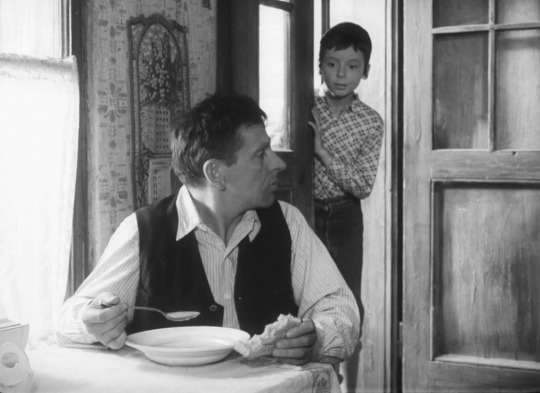
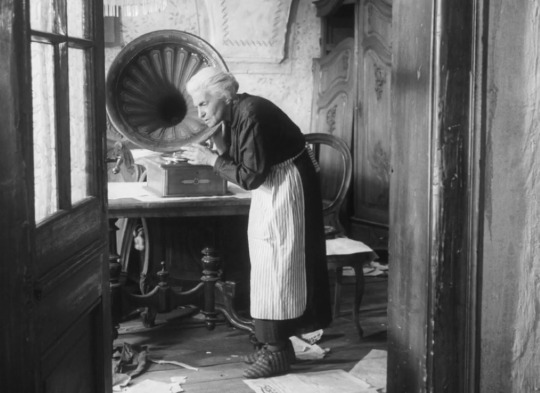
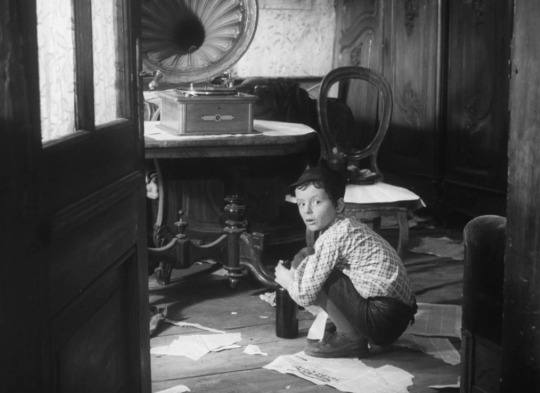
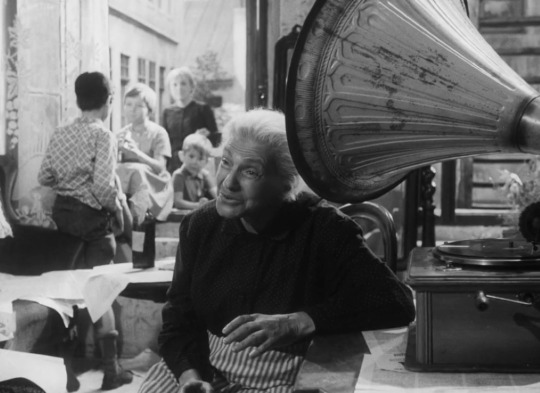
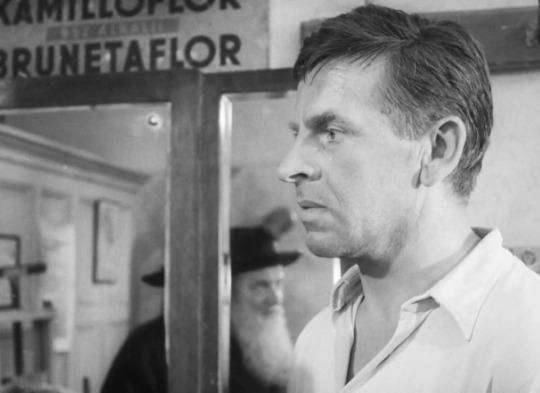
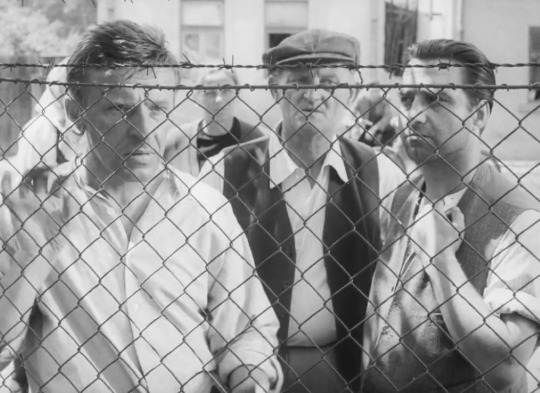
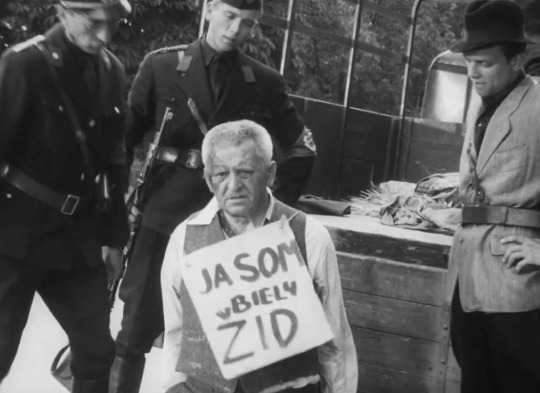
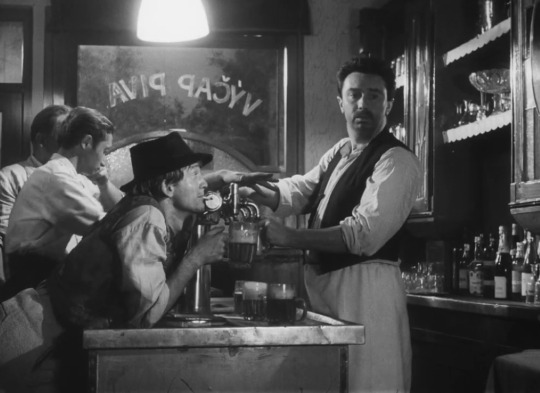
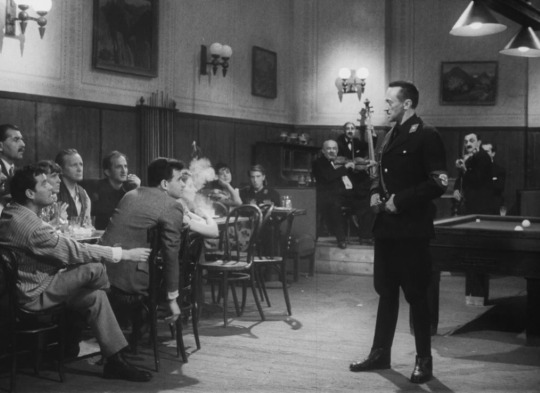
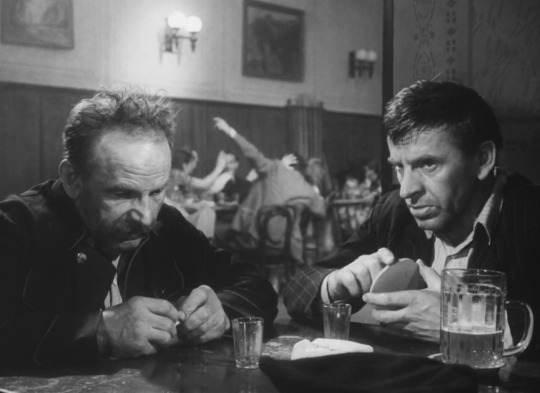



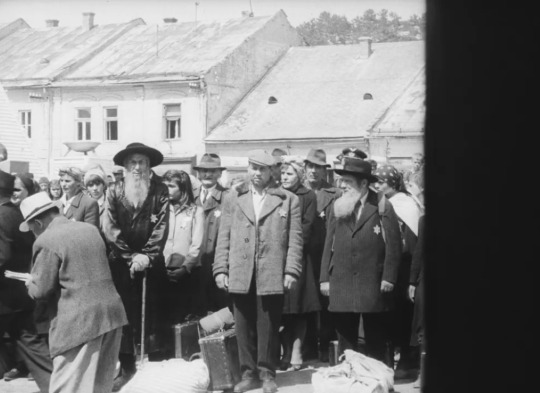
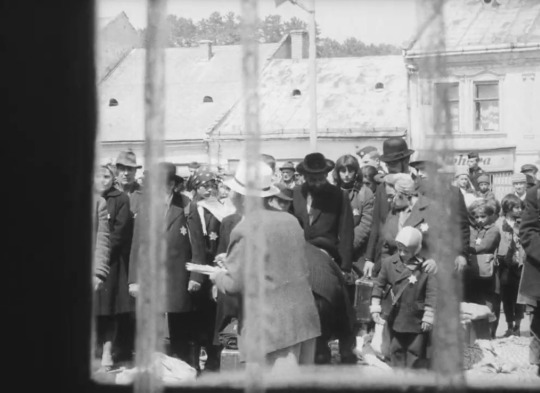
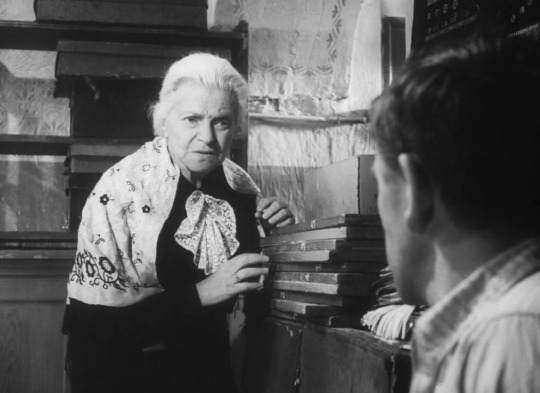
obchod na korze, ján kadár, elmar klos 1965
#obchod na korze#the shop on main street#ján kadár#elmar klos#1965#ida kaminska#jozef kroner#baumeister solness#hans schweikart#woyzeck#werner herzog#die blechtrommel#volker schlöndorff#vargtimmen#tystnaden#ingmar bergman#eraserhead#david lynch#the pianist#roman polanski#david#peter lilienthal#die rebellion#michael haneke#radetzkymarsch#michael kehlmann#the great dictator#charlie chaplin#bible#genesis 11-9
6 notes
·
View notes
Text

Frederick I of Austria (1289-1330). By Pieter van Sompel.
#pieter van sompel#engraving#haus habsburg#pieter soutman#Friedrich der Schöne#erzherzogtum österreich#erzherzog#king of romans#heiliges römisches reich#Römisch deutscher König#herzog von österreich#engravings#house of habsburg
0 notes
Text
youtube
A Florida Legacy: Sam and Robbie Vickers’ transformational gift to the Harn Museum of Art
Here is the video on The Florida Art Collection, an extensive collection of Florida-themed paintings, drawings, and watercolors that includes many prominent American artists from the late 19th to the mid-20th centuries including paintings by such celebrated artists as Winslow Homer and John Singer Sargent gifted by Samuel and Roberta Vickers as the collection transitions from their North Florida home to the Harn Museum of Art.
Shoutout to everyone who assisted me and my team in helping tell the story behind this collection.
Creative Director - David Houder
Editor - Brenton Richardson
Audio/Video Recordings by:
Tom Bacsick
Alex Baucom
Aaron Daye
Ray Hays
David Houder
Brenton Richardson
Joel Tower
#Youtube#Harn Museum of Art#sam vickers#robbie vickers#samuel vickers#roberta vickers#lee anne chesterfield#dulce roman#A Florida Legacy#florida art#winslow homer#john singer sargent#milton avery#ralston crawford#martin johnson heade#herman herzog#thomas moran#earl cunningham#emmet fritz#jane peterson#durett stokes#martha walter#david houder#brenton richardson#tom bacsick#alex baucom#ray hays#joel tower#aaron daye#aaron daye photography
0 notes
Note
Hi, I have a question regarding charter cities in ASOIAF. If I understood correctly, a charter city is a city that can engage in international trade and is self-governed, with the citzens electing their officials instead of being governed by a feudal lord, among other rights. However, in Westeros there are cities, such as Oldtown, Lannisport, White Harbor, Gulltown and King's Landing , that engage in international trade but are ruled by noblemen. Did I understand something wrong?
You've identified two of the big rights - international trade and self-government - that city charters granted, but there were other important elements: burgher (or borough) rights for its citizens, warehousing rights for domestic as well as international trade, the right to erect city walls, market rights, and so forth.
However, when it comes to self-governance, two things are simultaneously true. First, GRRM does not write about city councils, municipal courts, and other evidence of self-governance and instead describes cities as directly governed by noble houses (who control the city watch militias, crucially), albeit with the presence of guilds. Partially I think this is due to a desire to simplify his storytelling, since he's mostly writing about a feudal world, and partially I think GRRM is drawing from older historiography and historical fiction that emphasized more of a "great man" theory of history and pre-dated the "new social history" of the 1960s.
Second, it is also true that the self-governance of chartered cities was often not an absolute. Outside of Italian city-states that were their own independent republics, you had lots of chartered cities that combined local self-governance (especially in internal matters) with some form of incorporation into feudal structures. Often this took the form of the city being a direct vassal of the monarch - thus the City of London gets its charter from the King of England and doesn't owe homage to the lords of Middlesex, Essex, Surrey, Kent, or Hertfordshire.

Likewise, if you were a Freie und Reichsstädte (Free Imperial City) of the Holy Roman Empire, you were subordinate only to the Emperor, unlike the Landstadt (territorial city) who owed homage to their Prince-Bishop or Herzog or Margrave or Graf. However, both in England and the HRE, the charter structured and limited this vassalage in both material and symbolic terms. (Imagine how complicated it could get when a city was simultaneously a vassal of the Holy Roman Emperor and a member of the Hanseatic League along with other cities that were part of the Kingdom of Denmark etc.) Hence why the English monarch still has to ask permission from the Lord Mayor in order to enter the City of London, or why you had Prince-Bishops who were legally barred from entering the cities they ruled.
This mixed governance structure often came with some form of representation in a national assembly - towns and cities with borough rights sent burgesses to the English Parliament alongside the knights of the counties, and in the Holy Roman Empire Imperial Cities were represented in the Imperial Diet along with the Electors and secular and ecclesiastical princes.
GRRM also neglects this part of medieval history: we don't see King's Landing or Oldtown or White Harbor or Gulltown sending their own representatives to the Great Councils, for example.
44 notes
·
View notes
Text
"as the tides turn" (c.m.)

summary:
The BAU, joined by Emilia Wren, are called to Florida to investigate a case where the unsub drowns their victims and then dumps their body at a secondary location. Can they locate and stop the killer before it's too late?
This story was written using the "showrunners challenge", so at the end of each chapter, I rolled a D12 and followed whatever prompt was listed...which resulted in only minor hiccups.
cw/tw: mentions of drowning. it's a case fic, so they're talking about murder and unsubs and all the usual things that happen during a CM episode.
(read on ao3) || fic has 5 chapters
CHAPTER ONE: "as the tide rolls in"
“What would an ocean be without a monster lurking in the dark? It would be like sleep without dreams.” - Werner Herzog
Florida's oppressive, wet humidity ran its sticky fingers down the middle of Spencer’s back and cupped the nape of his neck in clammy rivulets of sweat. He shifted uncomfortably and swatted away an errant gnat that flew into his face. The rank of low tide and the sound of crying gulls surrounded the team, though he suspected they would soon be overwhelmed by white vans and clamoring reporters. This was, ironically enough, their few seconds of peace before the storm hit.
“Man was out walking his dog and saw her,” Deputy Roman said, “called it in right away.”
Hotch asked, “No other witnesses? And he didn’t approach the body?”
Roman shook his head. “I think it’s pretty obvious she’s been here awhile,” the deputy said while lifting the yellow police tape for Spencer and their newest member, Emilia, to enter the crime scene. Although considering Emilia was barely five feet tall, she didn’t need to duck as much as he did to cross the line. They maneuvered past crime techs taking photographs of the beach, and the body, and collecting samples of sand and seaweed.
“The unsub has familiarity with the tides,” Emilia said as she crouched next to the body, her short dark brown hair swaying in the seaside breeze, “he knew when to dump the body.”
“So, the unsub wants the victims found.” Hotch’s dark brow furrowed.
Spencer shot a glance toward Emilia, though his attention was swiftly drawn to the deceased—murdered–woman on the beach. She was Caucasian, likely in her early to mid-twenties, with blonde hair and dark roots. Her cheeks were puffy and ashen, and he could see her eyelids' delicate, blue veins. The deputy said the body had been here a while, but that couldn’t be accurate.
“A coastal area like this one would experience two tidal bulges,” Spencer said, “and it takes about six hours and twelve and half minutes for the water to go from high to low tide.”
Morgan crossed his arms and looked at the tall, blonde-haired deputy. “This is a small beach for residents only. How many go through here in a day?”
“This time of year? Not many, I’m afraid.” He rubbed his mouth. “Most of the residents in this area are snowbirds. They start flying to their second homes by mid-June.”
“Her body has started to bloat which means she’s been dead for at least seventy-two hours,” Emilia cut in, “and based on the tidal bulges, as Reid said, there’s only a six-hour window before the sea would’ve swallowed her.”
“We need confirmation from the medical examiner,” Spencer said, “humidity increases the decomposition rate.” He met Emilia’s honey-brown eyes framed by long lashes clumped with mascara. She tilted her head slightly in acknowledgment but said nothing more. A surge of relief swept through him. He had lived with himself long enough to recognize that sometimes his instinct to fact-check or correct, could rub people the wrong way, and put them on the defensive, and thankfully that had not happened with Emilia. Not ever, actually, now that he considered it. Usually, she’d reply with a soft and pensive ‘thank you’ whenever he’d share an anecdote.
Hotch said, “Either way, it’s clear the unsub killed her and then moved her here.” He took his phone from inside his blazer pocket. “Reid, head back to the station and start the geographical profile. We’ve got two bodies and two different dump sites that are miles away from one another.”
Spencer nodded.
“Deputy Roman, I need your people canvassing the area. If there’s a chance any of these homes are being rented while their owners are away that means someone could’ve seen something.”
“I think if someone saw or heard a woman being murdered then they would’ve called 911,” said Roman smugly.
Spencer opened his mouth to reply, but Emilia beat him to it.
“Our suspect likely drives a van or truck, considering they were able to transport a body,” she said, “have your guys ask about suspicious or unfamiliar vehicles within the past week or so.”
“Week?!”
“This unsub is organized and would’ve vetted the area beforehand.”
“Garcia,” Hotch said into his phone while walking toward the car, “we need catastrophic incidents in the area within the past five years.”
“I shall wave my magic wand and return with your wish granted, sir,” Garcia said, as chipper as ever before disconnecting.
“Wren–” he looked at Emilia, “I want you and JJ to interview the first victim’s mother.”
“Yes, sir.”
Spencer slid into the backseat next to Emilia. The leather interior stuck to his palms, though he was grateful for the rush of air conditioning that expelled in a rush from the vents and tousled his light brown hair.
Morgan twisted in the passenger seat, his sunglasses pushed up onto his head, and his attention on Emilia. “Nothing like returning to your hometown, huh little bird?”
She scoffed, rolling her eyes and Spencer’s body went taut and quiet. Hometown?
“First of all, we lived fifty miles upstate,” she said while leveling Derek with a flat, intense stare. “And it hardly constitutes a ‘hometown’ when I lived there for a mere two years when I was fourteen.”
Derek smiled. “Fourteen is an impressionable age. You could’ve been a lifeguard instead of an FBI agent.”
Her lips quirked. Derek had that easy-going charm to him that most – especially women – found either irresistible or endearing. He scanned her face, checking for the telltale signs of attraction: dilated pupils, quickened breath, flushed cheeks, or mirroring body language. It was instinctual to him. He had to consciously turn off the parts of his brain that profiled and analyzed. But, Emilia leaned into her seat, crossed her legs, and replied to him with a casual, and straightforward tone.
“I think my innate sense of morality and justice would’ve put me on this path one way or another.”
“Nature versus nurture.”
Spencer found his moment to chime in, “John Locke said that ‘the mind is like a tabula rasa, a blank slate, which is later filled by experience,’ and that we, with the freedom of our individuality, must fill our lives with experiences to gain knowledge and understanding. If we follow Locke’s philosophy, then we wouldn’t be born with a sense of justice built in, but rather experience hundreds to thousands of different moments and memories that shape our perception towards the world, our interpersonal relationships, and our relationship to the concepts of justice, morality, and ethics.”
“Says the boy genius with an 187 IQ,” Morgan teased.
“Hey, his mom was a professor,” Emilia said, rising to Spencer’s defense with a light smile which in turn made his chest glow with warmth.
Before Morgan could make a counter-argument, his phone rang and Garcia’s bright voice sang out over the speakerphone. “Hello, my beauties. I’ve got the deets on our first victim, Mary-Anne. She was majoring in fashion design, although, she took several of her general education classes at the local community college before transferring.”
“Nice work, baby girl,” Morgan said, “how’s the staff look? Has anyone fired or filed grievances in the past six months?”
“No terminations, although one professor was put on academic probation.”
“Keep digging, Garcia,” Hotch said, “until we identify our Jane Doe, Mary-Anne is the only link to the unsub.”
~~~~~~~~~~~~~~~~~~~~~
[Chapter Two ->]
Some general housekeeping if you are curious: 1) Every roughly 1k words, I end the chapter and roll my d12 to see what happened next. 2) I told myself that this fic would take place over a single case and would end once the investigation did (much like the in TV show). 3) credit to this challenge goes to Runawaymarbles (also sorta by sprintingowl) on Tumblr 4) I'd love to hear any feedback considering this was my first time writing a challenge :,) Enjoy!
I rolled my D12 and got the number 3 which reads: Fan favorite. Your most recently mentioned character (or named object) is now beloved by the audience. You must give it a bigger part in the story, a special destiny, or an important new romance or friendship. If you get this twice for the same character or object, the adoration cools and you must go back to treating the character or object normally.
10 notes
·
View notes
Photo







1680-1710 Jean Mariette
Joseph I Holy Roman emperor
Mademoiselle des Mastins dancing at the Opera
Philip V of Spain
Monsieur le Maréchal de Tallard
Madame la Duchesse de Porsmouth
Madame La Marquise de Richelieu
Monsieur le Maréchal de Vauban
(Herzog Anton Ulrich Museum)
172 notes
·
View notes
Note
What are your favorite and least favorite architectural styles?
I don’t really like specific styles so imma just list some things
Fave architect: shigeru ban



Fave building: Là fabrica, Ricardo bofill


Other buildings I like:
Herzog and de Meuron’s Dominus winery (love a gabion wall)

Herzog & de meurons elbfilharmonie (it’s cringe but I do)

St benno gymnasium, behnisch architekten (it renewed my interest in architecture)

Roman amphitheater, Lucca (squatters took over a Roman amphitheater)

Notre dame du haut, le corbusier (he did have some good designs unfortunately)

18 notes
·
View notes
Text
Murat in Königsberg, December 1812
While looking for more information of a certain general Loison I came across something much better: A Saxon report of Murat reviewing troops in Königsberg, while he was at the head of the Grande Armée, after the retreat from Russia and after Napoleon had gone home to warm cuddly Paris. Enjoy.
(Translated from: Karl Geissler, Geschichte des Regiments Herzoge zu Sachsen unter Napoleon mit der großen Armee im rußischen Feldzuge 1812, Jena 1840)
Even though the King of Naples, who immediately had the troops take up their arms before he descended, won everyone's heart at this inspection by his immense affability, he was particularly friendly towards the regiment of the Dukes of Saxony.
He first greeted it with the call: "Ah, ces braves Saxons!" and then expressed unconditional praise for its previous conduct towards Colonel v. Egloffstein.
He was less friendly towards the other regimental commanders, and as far as the 6th Regiment in particular was concerned, one even thought to hear the words: "que vous méritez des reproches", which perhaps referred to the above-mentioned, partly unsuccessful escorting of some money sledges.
Murat then had the regiments paraded before him and his brilliant entourage, with the remnants of the French and Italian regiments No. 1, 3, 29, 105 and 113 leading the way accompanied by the thousand-voiced cry of joy, "Vive l'empereur!"; then followed the Frankfurt and the ducal Saxon regiments, also shouting, "Long live the emperor!" and finally the 5th and 6th, both of which marched by in silence.
During this revue we had a very good opportunity to get a close-up view of King Murat, who attracted everyone's attention with his stature, expensive costume and rich harness. His face, his beautiful black eyes and black curly hair, which fell down on his kurtka, - a Polish suit, whose tight sleeves had an opening under the armpits - captured the eye. The collar was richly embroidered with gold, and a golden belt was fastened around this garment, from which hung a light sword with a straight blade, Roman style, without edge or guard. He wore wide amaranth-coloured trousers and yellow gold-spurred boots. -- The splendour of these clothes, which were covered by a green gold-embroidered coat, was further enhanced by a square red Polish chako with broad gold embroidery and a plume of four large ostrich feathers falling back, from the centre of which rose a magnificent heron feather. The saddle and stirrups were gilded and of Turkish shape. The horse was covered with a gold-embroidered sky-blue saddlecloth and the bridle, appropriately, was truly magnificent. Murat's entourage, of course, was also rich and brilliant, but it was nowhere close to him. He, the only medieval character of romantic poetry in the French army, outshone them all and in his tight-fitting kurtka, in his yellow or nanking-coloured riding boots, with his ostrich feather ornament proudly swaying around the Polish sammet cap on the Andalusian steed, stood out wonderfully against the heavy gold-embroidered marshals' uniforms and the soldiers of the French army. Napoleon, however, appreciated these distinguishing elements of his brother-in-law, who, like a knight of the Round Table, like a modern paladin of love and honour, shone with his dark eye and long hair among the heroes who surrounded the Emperor. Murat was, as mentioned above, the soul of French cavalry, a true Chevalier reminiscent of the Troubadours, with all the charm of romanticism, all the courage, daring and bravery of earlier times, as graceful as it is sublime in legends and fairy tales.
I’d say Murat, in those final days of the empire, still managed to get himself some fans.
27 notes
·
View notes
Text
2023 Reading Roundup
Everything what I read in 2023
I read a whole bunch.
Heartily Recommend Visceral Bleh Reread *Audiobook*
Fiction
Where the Crawdads Sing by Delia Owens (where is the fucking humidity in your swamp, Delia??)
Days Without End by Sebastian Barry
Lot by Bryan Washington
Mr. Loverman by Bernadine Evaristo
A Court of Thorns and Roses by Sarah J Maas
Trust by Hernan Diaz
The Remains of the Day by Kazuo Ishiguro
The Cellist of Sarajevo by Steven Galloway
The Unquiet Dead by Ausma Zehanat Khan
It Ends with Us by Colleen Hoover
By Nightfall by Michael Cunningham
Wolf Hall by Hilary Mantell (but everyone is called Thomas)
Verity by Colleen Hoover (awful but wacky and hilariously awful)
Katalin Street by Magda Szabo
The Marriage Portrait by Maggie O’Farrell
Our Missing Hearts by Celeste Ng
Animorphs #24 The Suspicion by KA Applegate (a trip)
Lost Children Archive by Valeria Luiselli
The Island of Forgetting by Jasmine Sealy
Everything I Never Told You by Celeste Ng
The Trio by Johanna Hedman
At the Bottom of the River by Jamaica Kincaid
The Whale Rider by Witi Ihimaera
Libertie by Kaitlyn Greenidge
Silence by Shusaku Endo
When Women Were Dragons by Kelly Barnhill
Babel by RF Kuang (was so disappointed by this one)
The Bass Rock by Evie Wyld
Island by Siri Ranva Hjelm Jacobsen
The Gold-Rimmed Spectacles by Giorgio Bassani
Must I Go by Yiyun Li
The 1,000 Year Old Boy by Ross Welford
She Who Became the Sun by Shelley Parker Chan
Ariadne by Jennifer Saint
The Singer’s Gun by Emily St. John Mandel
Memphis by Tara M Stringfellow
The Whirlpool by Jane Urquhart
Get a Life, Chloe Brown by Talia Hibbert
A Country of Eternal Light by Paul Dalgarno
Yellowface by RF Kuang
The Country of Others by Leïla Slimani
The Grass is Singing by Doris Lessing
American Wife by Curtis Sittenfeld
All Passion Spent by Vita Sackville-West
The House of Doors by Tan Twan Eng
Game Misconduct by Ari Baran
Demon Copperhead by Barbara Kingsolver
Uprooted by Naomi Novik (sorry Naomi :/ )
The Foot of the Cherry Tree by Ali Parker
The Big Sleep by Raymond Chandler
Matrix by Lauren Groff
The Twilight World by Werner Herzog
Wild by Kristen Hannah
*The Fraud by Zadie Smith*
The Mountains Sing by Nguyen Phan Que Mai
The Wind Knows My Name by Isabel Allende
Remarkably Bright Creatures by Shelby Van Pelt
This Other Eden by Paul Harding
The Kraken Wakes by John Wyndham (weirdly, one of the best depictions of a marriage I’ve read)
The Nickel Boys by Colson Whitehead
Against the Loveless World by Susan Abdulhawa
North Woods by Daniel Mason
Shadows on the Rock by Willa Cather
The Tiger’s Wife by Téa Obreht
Animorphs: The Hork-Bajir Chronicles by KA Applegate
Roman Stories by Jhumpa Lahiri
Animorphs #13 The Change by KA Applegate
Animorphs #14 The Unknown by KA Applegate
Animorphs #20 The Discovery by KA Applegate (snuck in two more under the wire… #20 is when shit REALLY kicks off. From there it gets darker and darker).
Poetry
Black Cat Bone by John Burnside
Women of the Harlen Renaissance (Anthology) by Various
The Analog Sea Review no. 4 by Various
The World’s Wife by Carol Ann Duffy
Non-Fiction
Besieged: Life Under Fire on a Sarajevo Street by Barbara Demick
Atlas of Abandoned Places by Oliver Smith
Novelist as a Vocation by Haruki Murakami
Empire of Pain: The Secret History of the Sackler Dynasty by Patrick Radden Keefe
Wanderers: A History of Women Walking by Kerri Andrews
City of Laughter: Sex and Satire in Eighteenth Century London by Vic Gatrell
The Lazarus Heist: From Hollywood to High Finance by Geoff White (fully available as a podcast)
The Entangling Net: Alaska’s Commercial Fishing Women Tell Their Stories by Leslie Leyland Fields (very niche but fascinating. Transcribed interviews)
Free: Coming of Age at the End of History by Lea Ypi
Hijab Butch Blues: A Memoir by Lamya H.
Freedom by Margaret Atwood (just excerpts from novels repackaged)
*Born a Crime by Trevor Noah* (Noah’s narration is superb)
The Slavic Myths by Noah Charney and Svetlana Slapšak (was expecting stories, but it was mostly academic essays)
Manga, Comics, Graphic Novels
Safe Area Goražde by Joe Sacco
The Way of the House-Husband, vol. 1 by Kousuke Oono
SAGA vol. 1-6 by Fiona Staples and Brian K Vaughan
Top of the Top:
Born a Crime was probably my favourite non ficition, and most of that probably is due to Trevor Noah's narration skills. It was very entertaining and heartfelt.
Less uplifting but just as gripping in a different way was Empire of Pain. Excellent book that went deep into the why and what and hows of Purdue Pharma. Anger inducing.
Lazarus Heist is great and available as a podcast. The book is more or less the podcast word for word.
Fictionwise: I read Trust at the start of the year and it was a bit soon to declare as favourite of the year, but it's stil made the final cut. Just very imaginative and intriguing. Just my kind of MetaFiction. Clever without being cleverclever.
Demon Copperhead I read right off the back of Empire of Pain so maybe that coloured my experience. I've not read any Dickens so loads of references no doubt flew past me, but the language was acrobatic and zingy. I loved it.
Wrapped up the year on a high with North Woods. That was so unexpected and entertaining. Again with the playful language, memorable characters and a unique approach to tying all the various stories together. One that sticks in the mind and makes the writer in me wonder how I can replicate his style (with my own personal twist of course.)
#a whole bunch of books#reading roundup#Still one day to go but i don't think i'm going to finish anything else#year in books#2023 in books
6 notes
·
View notes
Note
On Nabokov* and Bellow- I love and respect both, especially Bellow’s determination to use every register of the language, but I do have qualms with him- mostly a kind of lingering unease about his proximity to Strauss and that whole UofC elitist-classicist thing. (To be fair, in the novels themselves I think it’s mostly denatured by streetwise Jewish humanism and the schlemiel quality of most of his protagonists, but all the same one sometimes thinks they can faintly detect something lurking in the depths between the words.)
*I think we have the same qualms about Nabokov, so I won’t enumerate em here
Amis claims that when we say we love an author, we only mean a handful of books. Accordingly, what I have no qualms about is the sequence Augie-Henderson-Herzog. The rest I am either not that interested in or not that familiar with, partly for the reasons you mention; the Strauss-Chicago thing—I assess it only from a distance—is culturally sterile on its own and is in its philosophical supremacism deadly for an artist. Existing in tension with other, more disruptive tendencies, however, as it also did, strangely, in Sontag, it can be fruitful.
Re: Nabokov: Amis wrote an essay about 15 years ago where he conceded that the master probably did have a thing for 12-year-old girls considering the frequency with which they appear, pantingly described, across his oeuvre. I've long suspected this has to be final turn of the screw in interpreting Lolita. If Humbert's not renouncing something real, a desire depicted as metaphysically authentic irrespective of morals, then the novel is without emotional ballast or philosophical point. It's only about a pathological case, the very possibility mocked and dismissed in the preface. But when we allow that the book legitimates Humbert's desire if not its fulfillment, largely through the eroticism of its prose, we undermine the already shaky case for the Kantian moral therapy it is supposed to administer according to Rorty and others, as if the only point were to treat others with kindness, a recommendation that may be made without either the mythical apparatus of nymphetology or the aestheticization of pornography. Lolita really is closer to certain Platonic gay novels, not only Death in Venice but also Billy Budd and Dorian Gray; these don't shy from implicating their authors in the forbidden desire the authors' gaze transmits in the very course of narratively surrendering, this to elevate art over eros. An unspoken and unspeakable consensus about the differing natures of male and female sexuality irrespective of gay/straight, as well as Greco-Roman aesthetic precedent, leads us to tolerate the scenario more when the object of desire—real desire, thus painful to be renounced even if it must be renounced, as in the Phaedrus—is a boy rather than a girl. Hence we squeamishly deny what Lolita is actually about, missing both the true nature and the true cost of its greatness. My uncharacteristically moralistic hope is that we have progressed past the point where we need to illustrate this philosophical thesis with this subject matter.
3 notes
·
View notes
Photo









Arnaud Montagard ・ Saul Leiter ・ Dino Kužnik Joel Sternfeld ・ Fred Herzog ・ Roman Signer Stephen Shore ・ Terry Richardson ・ William Eggleston 注目している写真家
3 notes
·
View notes
Note
Who are some of your favorite directors?
Ooo… so many to choose from… I think my absolute favorite would be Ingmar Bergman. I love the way he tells his stories. How interior they are. There’s a very haunting quality to his films. I also really love Stanley Kubrick, he really knows how to draw you in to other worlds. Dario Argento is another favorite. His films are so rich with light and color, yet his raw and rare form of violence, the fearlessness of what he puts on screen is… really inspiring.
Jean Cocteau is another favorite, he is one of my favorite overall artists. Surrealism is a style that I have always gravitated to. I could go on for ages…Juraj Herz…Alfred Hitchcock for obvious reasons. Some honorable mentions include: Lars Von Trier, Fritz Lang, and Luca Guadagnino. Female directors… I wish there were more of them… I love Maya Deren. She is one of my major inspirations as an overall artist. I also love Anna Biller, she’s another one who is so aesthetic that it hurts, while still being fun and relevant.
As for more conventionally popular directors (who’s films I watch time and time again) Tim Burton was always a major influence. It feels so generic to be a goth girl and say that lol, yet he really did have a profound influence, and he certainly is a genius. Very good at creating an atmosphere, and adding his fun flair to all that he does. Also LOVE Francis Ford Coppola—the man is a walking opera. Guillermo del Toro is one of my favs, as is Martin Scorsese, Steven Spielberg, Vincente Minnelli, and George Cukor.
Love Darren Aronofsky, Orson Welles, F.W. Murnau, Roman Polanski (I don’t agree with his personal choices, but I do love his films), Frank Capra, Ernst Lubitsch, and who doesn’t love Francois Truffaut. Federico Fellini is an obvious one, as is Jean-Luc Godard, Werner Herzog, and Josef Von Sternberg.
Louis Malle has an interesting take on the world, and I quite like Jonathan Demme. Oh! I also love Jim Jarmusch.
5 notes
·
View notes
